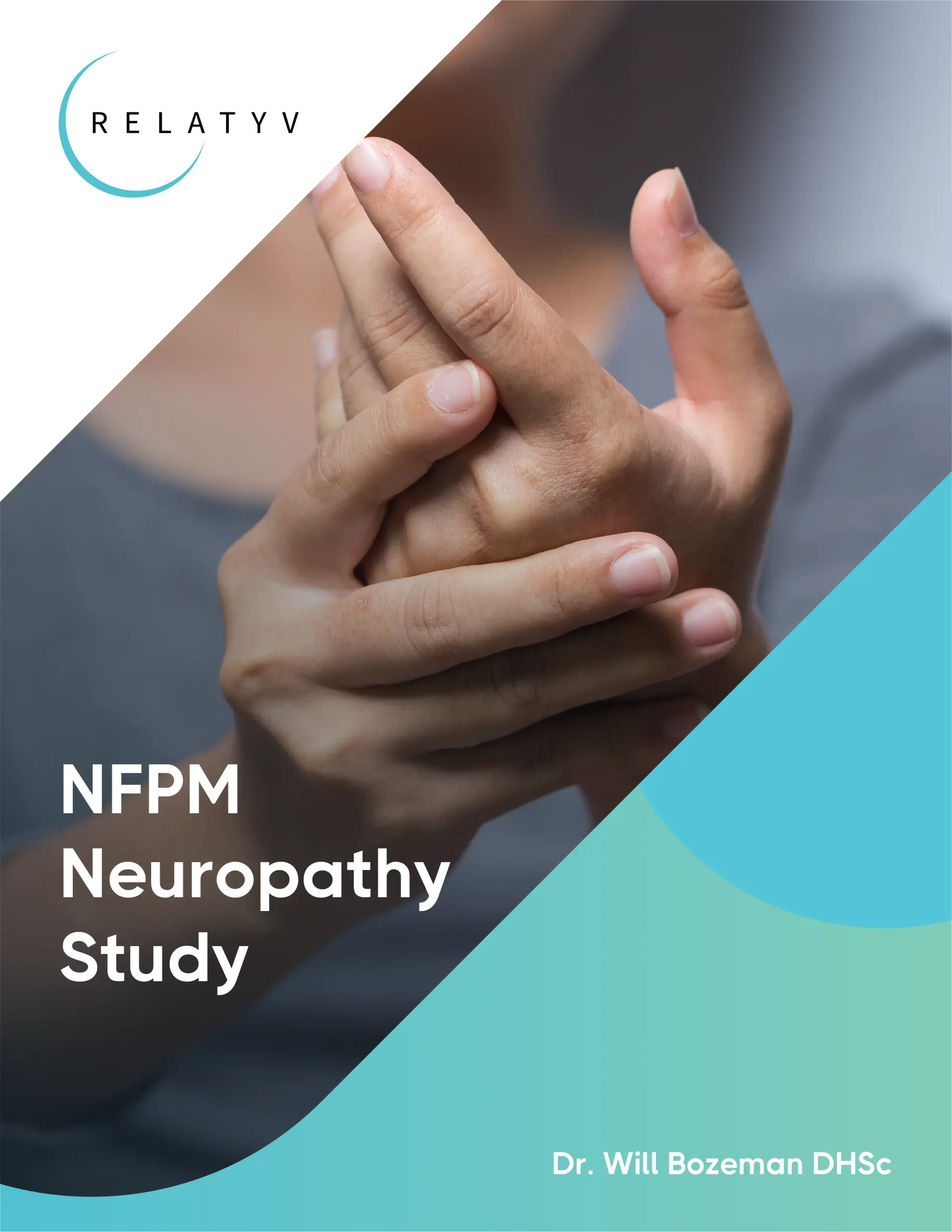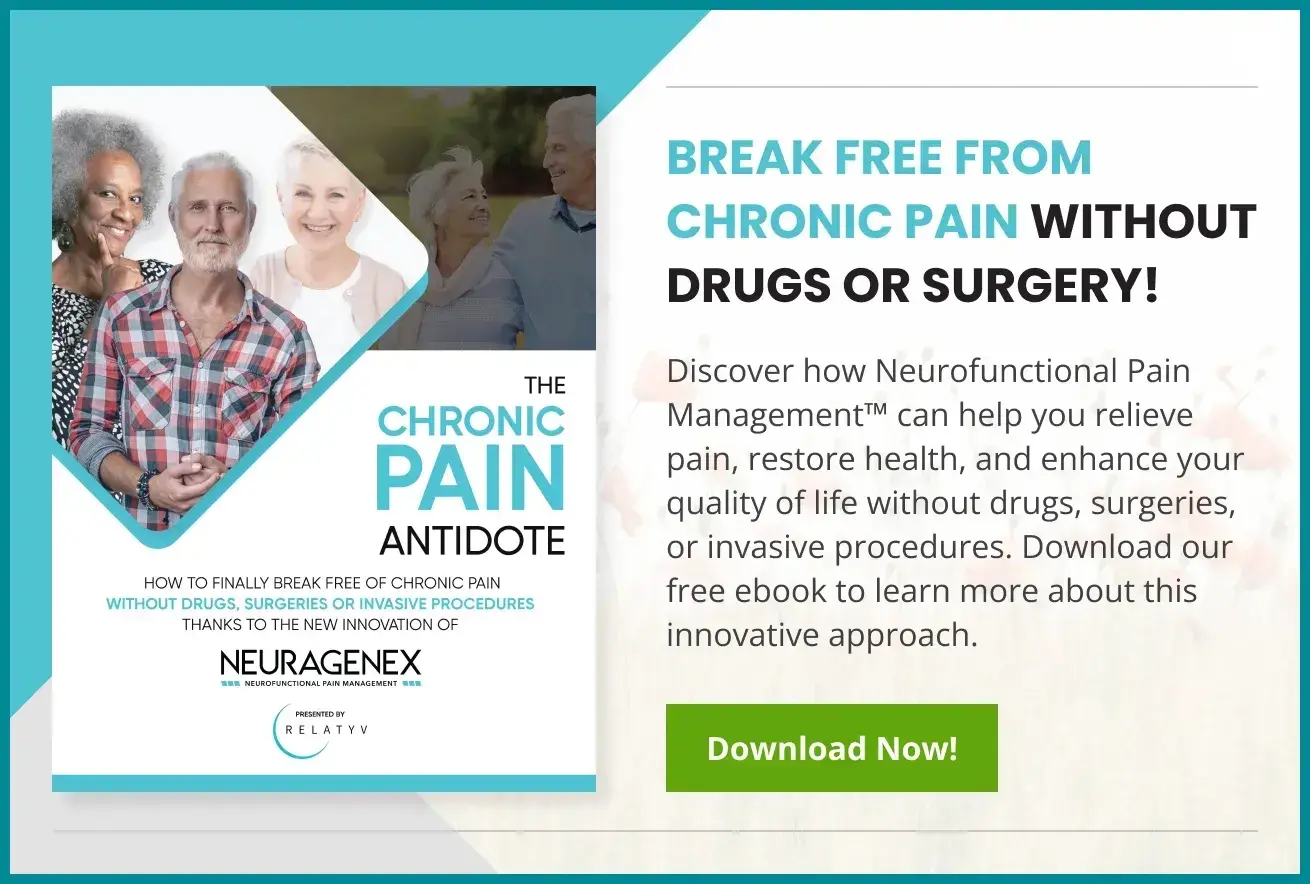We accept all major insurances
Enter your details to begin your journey with us
Non-Surgical & Drug Free Solution
Are You Ready to be Free From Pain?
Contact Us Today!
Enter your details to begin your journey with us


Lifestyle counseling is an approach to managing chronic pain that involves identifying, assessing, and modifying lifestyle factors contributing to an individual’s pain. For example, lifestyle factors such as nutrition, physical activity, stress, sleep quality and quantity, and alcohol consumption could all contribute to a person’s symptoms.
Through lifestyle counseling and patient education programs on health promotion and disease prevention, patients can gain a better understanding of their condition, develop positive coping skills, and make behavioral changes that can help them reduce and manage their pain effectively, such as changing their diet, increasing physical activity levels, or learning stress management skills and relaxation strategies.
Lifestyle counseling can help alleviate physical symptoms associated with chronic pain and help individuals develop healthier habits that could lead to improved overall health and wellness. This type of counseling also encourages a more positive attitude towards pain management, which may help reduce feelings of hopelessness and despair that often come with long-term suffering.
The Neurofunctional Pain Management approach is based on a whole-person approach to pain management. This means that various non-invasive, drug-free, non-chiropractic treatments and other therapies are supplemented with lifestyle counseling and patient education programs on health promotion and disease prevention.
Lifestyle counseling helps patients better understand their condition and develop positive coping skills while also making behavioral changes that can help reduce and manage their pain effectively over the long term. The following are a few ways in which we implement lifestyle counseling as part of a Neurofunctional Pain Management approach to treating chronic pain:
At Neuragenex, we tailor our treatment plans to each individual patient based on their lifestyle and medical history. Our personalized treatment plans focus on the following:
Our lifestyle counseling isn’t only about helping patients manage their pain and encouraging them to make healthier choices that coud lead to improved overall health and wellness. In addition, we provide education and support to help patients make positive changes in their lives, such as learning new ways to manage stress, changing negative patterns of thinking, and developing healthier habits.
By helping patients make lifestyle changes, they can better manage their chronic pain and lead a more fulfilling life. In addition, we provide ongoing support to help them stay motivated and encourage them to stick with their treatment plan, even when progress may be slow.
Lifestyle counseling serves as a valuable tool in addressing a range of conditions and promoting overall well-being. By focusing on modifying behaviors, habits, and daily choices, this form of counseling aims to empower individuals to make positive changes that can enhance their health and quality of life. From managing chronic illnesses to preventing disease, lifestyle counseling proves particularly effective in addressing conditions influenced by lifestyle factors.
Dealing with any type of pain in the elbow can make daily activities difficult, since the elbow is used for almost all movements involving the arm, from bending and straightening to rotating and...
Migraine And Chronic Headaches
Chronic migraines are a serious condition that profoundly impacts all aspects of your life – for days at a time. During a migraine attack, the pain may be so severe that it can force you to stay in a quiet, dark room for hours, influencing your ability to...
Metabolic dysfunction is a complex disorder that affects one in three adults in the US and dramatically increases a person’s risk to suffer from heart disease, stroke, and diabetes. Often caused by risk factors such as inactivity, obesity, and high blood...
Knee pain is an extremely common complaint affecting people of all ages and backgrounds. It is often the result of repetitive use or injuries, but it can also be caused by various conditions. Knowing the possible causes of knee pain, associated symptoms, and...
Any stomach or intestinal discomfort can be a major disruption, causing significant physical and emotional distress. Even if it's temporary, it can throw a wrench in your day-to-day routine....
Fibromyalgia can be an incredibly debilitating condition that causes severe pain and fatigue that can prevent you from engaging in everyday activities. In fact, people with fibromyalgia tend to be more sensitive to pain in...
Endometriosis is a lifelong, painful condition that affects 6.5 million women in the US alone, causes a loss of over six hours of productivity a week, and profoundly impacts a person’s professional and emotional life. Nonetheless, surveys have shown that...
Interstitial cystitis (IC) is a chronic health condition affecting the bladder, causing persistent pain and discomfort in the lower abdomen. Aside from pain, several other uncomfortable symptoms may develop throughout the urinary system, significantly...
Substance use disorder (SUD) is a condition defined by the repeated use of substances, despite their harmful...
It's estimated that over 20 million Americans suffer from peripheral neuropathy. In fact, many believe it's significantly higher than that because the condition often goes undiagnosed and...
Did you know that the peroneal nerve, also known as the fibular nerve, conveys crucial messages between your brain and your lower legs, feet, and toes? In fact, this is such an important nerve that if it becomes dysfunctional, all of the orchestrated...
Osteoarthritis is a degenerative joint disease. It occurs when the protective cartilage between the bones in the joints wears away, leading to bone-on-bone contact and pain. Osteoarthritis can affect any of the body's joints, but most commonly affects hands,...
A tension headache is a type of headache caused by muscle contractions in the head and neck. Muscles are usually tight due to stress, anxiety, poor posture, or other factors. This tension can cause pain in the forehead, back of the head, and...
Carpal tunnel syndrome is a nerve condition that develops when the median nerve in the wrist is compressed, irritated, or damaged. The median nerve is a nerve located outside of the brain and spinal cord. It is responsible for controlling wrist movements and...
Phantom pain is a type of chronic pain that occurs when an amputated part of the body is still sending signals to the brain that it is there. As you can imagine, feeling such pain can be incredibly...
Also known as tic douloureux (painful tic), Trigeminal neuralgia (TN) is a chronic, lifelong condition that causes agonizing pain. The painful episodes usually focalize on one side of the face, develop in a matter of seconds, and can disrupt your daily...
Knee pain, in general, is one of the most common types of pain people experience in the U.S. In fact, knee pain is the second most common cause of chronic pain. When you consider the fact that the knees are among the most regularly used joints in our body,...
Chronic headaches plague over half of the global population, but no two types of headaches have the same impact on a person’s life. Among these are cluster headaches, some of the most painful head conditions known today. Also known as trigeminal autonomic...
Osteoporosis, a common musculoskeletal disorder, weakens bones and increases fracture risk. It develops silently, often diagnosed after a fracture. Understanding bone metabolism and types of osteoporosis is crucial for prevention and...
Temporomandibular Joint (TMJ) Dysfunction
Living with TMJ can be incredibly challenging. After all, this disorder affects the temporomandibular joint, which plays a massive role in being able to move your jaw. As such, symptoms can be exacerbated when you eat, talk, or yawn. If you have the symptoms...
Tendonitis occurs when a tendon becomes inflamed. It’s also a relatively common condition caused by overuse, injury, repetitive movement, or prolonged periods of inactivity. As such, it’s no surprise that over 70,000 adults in the U.S. miss work every...
Irritable bowel syndrome (IBS) can be a challenging and frustrating condition to live with. Although it does not usually lead to serious health problems, IBS can significantly impact daily activities and overall...
Dealing with chronic pain and stiffness in the shoulder can be a very challenging experience, especially when it impedes your day-to-day...
Tarsal Tunnel Syndrome causes foot and ankle pain due to involvement of the posterior tibial...
Explore the causes, symptoms, and effective treatments for chronic fatigue syndrome (CFS). Discover insights on managing and living better with...
Dealing with any type of pain in the elbow can make daily activities difficult, since the elbow is used for almost all movements involving the arm, from bending and straightening to rotating and...
Sciatica is a painful nerve condition that can cause extreme discomfort and even disability. It results from a pinched or irritated sciatic nerve, which is a long nerve that runs all the way from the lower back to the buttocks and...
Ankle sprains are a relatively common injury. They occur when the ankle ligament is overstretched or torn. This can happen from a sudden twist, fall, or impact to the ankle joint. Ankle sprains can vary in severity, with some causing mild discomfort while...
Experiencing a bone fracture is undeniably a defining and challenging time. It causes immediate pain, which might persist for weeks or even months during the healing...
Rheumatoid arthritis (RA) is a type of inflammatory arthritis, an autoimmune disease that occurs when the body’s immune system mistakenly attacks healthy...
A broken wrist is a relatively common injury that can happen to anyone. This type of fracture typically occurs from direct impact to the wrist, such as a sports injury or a fall onto an outstretched...
Living with restless leg syndrome (RLS) can be challenging and disruptive to daily life. It is a neurological condition that can make it challenging to fall asleep or stay asleep, which can have a significant impact on your quality of...
Radial tunnel syndrome (RTS) is a relatively uncommon condition that affects the forearm and wrist. The annual incident rate of RTS is estimated to be only...
Plantar fasciitis is a condition that causes intense pain and stiffness in the heel and bottom of your foot. It's often caused by inflammation or irritation of the plantar fascia, which is a thick band of tissue connecting your heel bone to your...
Interstitial cystitis (IC) is a chronic health condition affecting the bladder, causing persistent pain and discomfort in the lower abdomen. Aside from pain, several other uncomfortable symptoms may develop throughout the urinary system, significantly...
Discover the difference that lifestyle counseling can do for you.



You can see how this popup was set up in our step-by-step guide: https://wppopupmaker.com/guides/auto-opening-announcement-popups/
You can see how this popup was set up in our step-by-step guide: https://wppopupmaker.com/guides/auto-opening-announcement-popups/
Neurofunctional Pain Management Overview
Symptoms
Conditions Treated
Treatments
Articles by Category
Locations
Colorado
Wisconsin
Georgia
Hiram
Lawrenceville
Marietta
Powder Springs
Texas
Waco
Victoria
Illinois
Buffalo Grove
New Lenox
St. Charles
Arizona
Tucson
Waddell
Arlington
Avondale
Buckeye
Superior
Mesa
Palo Verde
Morristown
Tempe
Chandler
Anthem
Eloy
Florence
Fort McDowell
Phoenix
El Mirage
Coolidge
Gilbert
Arizona City
Casa Grande
Casa Blanca
Aguila
Sacaton
Apache Junction
Kearny
Stanfield
Goodyear
Litchfield Park
Alabama
Arkansas
California
Florida
Idaho
Indiana
Iowa
Kansas
Louisiana
Maryland
Michigan
Rhode Island
Minnesota
Mississippi
Nevada
New Jersey
New Mexico
North Carolina
Ohio
Pennsylvania
South Dakota
Tennessee
Utah
Virginia
Washington
